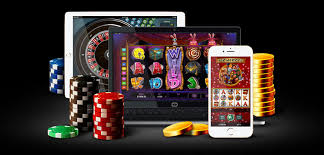16 Aug Exploring Decentralized Casino Platforms The Future of Online Gaming

Decentralized Casino Platforms: The Future of Gambling
The advent of blockchain technology has disrupted numerous industries, and one of the most exciting developments is the emergence of decentralized casino platforms. These innovative platforms are changing the way people engage with online gambling by providing transparency, security, and fairness. One notable example in this space is Decentralized Casino Platforms 9bet casino, which illustrates the potential of decentralized gaming experiences. This article will explore what decentralized casino platforms are, their key features, advantages, challenges, and the future prospects of this evolving trend.
What are Decentralized Casino Platforms?
Decentralized casino platforms leverage blockchain technology to create gambling experiences that are not controlled by a single entity or organization. Unlike conventional online casinos, which operate under centralized control, these platforms distribute ownership and decision-making across a network of participants. Smart contracts—self-executing contracts with the terms of the agreement directly written into code—underpin these platforms, ensuring that all processes are transparent and tamper-proof.
Key Features of Decentralized Casino Platforms
Several distinctive features set decentralized casino platforms apart from traditional counterparts:

- Transparency: Every transaction made on a decentralized platform is recorded on the blockchain, making it easily verifiable by users. This transparency helps to build trust between players and the casino.
- Security: The decentralized nature of these platforms makes them less vulnerable to hacking and fraud, as there is no single point of failure. Additionally, player funds are often held in smart contracts, reducing the risk of misappropriation.
- Fairness: Many decentralized casinos use provably fair algorithms to ensure that game outcomes are random and fair. This introduces a level of trust that is often lacking in traditional casinos.
- Anonymity: Players can enjoy greater privacy with decentralized platforms as they often do not require personal information or banking details to participate.
- Ownership: In many decentralized casinos, players can own tokens or cryptocurrencies that represent a stake in the platform, allowing them to participate in decision-making and profit-sharing.

Advantages of Decentralized Casino Platforms
The transition towards decentralized platforms offers several advantages for both players and operators:
- Global Accessibility: Without geographical restrictions imposed by traditional gambling laws, decentralized casinos can cater to a global audience. Players from different parts of the world can participate in games and earn rewards.
- Lower Fees: Since there are no intermediaries, players often benefit from lower transaction fees. This can translate to higher payouts and better odds compared to traditional casinos.
- Innovation: The competitive nature of the decentralized gaming space encourages continuous innovation. This leads to the development of new games, betting mechanisms, and unique player experiences.
Challenges Facing Decentralized Casino Platforms
While there are many benefits associated with decentralized casinos, challenges remain:
- Regulatory Concerns: The legality of online gambling varies significantly by jurisdiction, and decentralized platforms often operate in a gray area. This can create uncertainty for players and operators alike.
- User Education: Many players may be unfamiliar with blockchain technology and cryptocurrency, leading to a steeper learning curve for new users entering the decentralized gambling space.
- Scalability: As user numbers increase, some decentralized platforms may struggle with scalability, leading to slower transaction processing times and a less enjoyable user experience.
The Future of Decentralized Casino Platforms
The future appears bright for decentralized casino platforms. As awareness and acceptance of cryptocurrency grow, more players may turn to these innovative options for their gambling needs. The implementation of layer two solutions and improvements in blockchain technology could address some of the challenges currently faced, such as scalability and transaction speeds.
Moreover, partnerships between decentralized platforms and established gaming institutions could lead to further legitimacy and enhanced user experience. By bridging the gap between traditional and decentralized gaming, these collaborations could open up a new era of online gambling, combining the best features of both worlds.
Conclusion
Decentralized casino platforms signify a revolutionary shift in the world of online gambling. With their inherent advantages of transparency, security, and fairness, they offer an attractive alternative to traditional casinos. While challenges remain, ongoing technological advancements and growing acceptance of blockchain technology suggest a dynamic future for decentralized gaming. As players increasingly seek more control and greater trust in their gambling experiences, decentralized casinos are poised to lead the way in reshaping the gambling landscape for generations to come.


No Comments